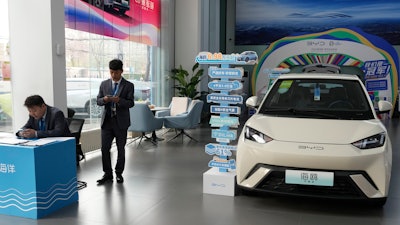
WASHINGTON (AP) — Chinese carmakers set up shop in Mexico to exploit North American trade rules. Once in place, they send ultra-low-priced electric vehicles streaming into the United States.
As the Chinese EVs go on sale across the country, America’s homegrown EVs — costing an average of $55,000, roughly double the price of their Chinese counterparts — struggle to compete. Factories close. Workers lose jobs across America's industrial heartland.
Ultimately, it could all become a painful replay of how government-subsidized Chinese competition devastated American industries from steel to solar equipment over the past quarter-century. This time, it would be electric vehicles, which America's automakers envision as the core of their business in the coming decades.
Low-priced Chinese EVs pose a potentially “extinction-level event’’ for America's auto industry, the Alliance for American Manufacturing has warned.
The trade deal that Beijing could potentially exploit — the U.S.-Mexico-Canada Agreement — was negotiated by the Trump administration and enacted in 2020. Its rules could let Chinese autos assembled in Mexico enter the United States, either duty-free or at a nominal 2.5% tariff rate. Either way, China could sell its EVs well below typical U.S. prices.
To defuse the threat, the U.S. does have options. Customs officials could rule that Chinese EVs don't qualify for the low-duty or duty-free benefits of being assembled in Mexico. U.S. policymakers could also pressure Mexico to keep Chinese vehicles out of that country. Or they could bar Chinese EVs from the U.S. on the grounds that they would threaten America's national security.
Whatever steps the U.S. government might take, though, would likely face legal challenges from companies that want to import the Chinese EVs.
The threat from Beijing is emerging just as U.S. automakers face slowing EV sales even while investing billions to produce them in a high-priced bet that Americans will embrace battery-powered autos in the coming decades. Comparatively high prices, despite federal tax incentives for buyers, have weakened EV sales in the United States. So has public anxiety about a scarcity of charging stations, potentially made worse by rising thefts of cables at charging stations.
Optimists suggest that an influx of ultra-low-priced Chinese EVs could accelerate U.S. electric vehicle purchases, speed up investment in charging stations and force down prices.
At stake is an enormously consequential question: Who stands to dominate the manufacture and sale of zero-emissions electric vehicles?
China has so far taken a daunting lead. It accounted for nearly 62% of the 10.4 million battery-powered EVs that were produced worldwide last year. The United States, at No. 2, made about 1 million — less than 10% of the total, according to the consulting and analysis firm GlobalData.
In achieving technological breakthroughs while holding down costs, Chinese automakers have made remarkable strides. China’s BYD last year introduced a small EV called the Seagull that sells for just $12,000 in China ($21,000 for a version sold in some Latin American countries). Considered a marvel of engineering efficiency, its lightweight design allows the Seagull to go farther per charge on a smaller battery. BYD has said it's considering building a factory in Mexico — but only for the Mexican market.
U.S. policymakers and auto companies are less than reassured.
Critics note that BYD and other Chinese EV makers have achieved their cost efficiencies thanks to heavy government subsidies. Beijing spent 953 billion Chinese renminbi (more than $130 billion at current exchange rates) on EVs and other green vehicles from 2009 through 2021, according to researchers at the Center for Strategic and International Studies.
Last month, Biden drastically raised the tariff on Chinese EVs, from the 27.5% established under Trump to 102.5%. It's meant to price even the bargain-priced BYD Seagull out of the U.S. market. (Europeans are worried, too: The European Union says it plans to impose tariffs of up to 38.1% on Chinese EVs for four months starting in July.)
The U.S.-Mexico-Canada Agreement, though, potentially lets vehicles assembled in Mexico — even if made by European or Asian automakers — enter the U.S. at a much lower tariff or none at all. If made-in-Mexico cars met the USMCA's requirements, they could enter the United States duty-free. At least 75% of a car and its parts would have to come from North America. And at least 40% of it must originate in places where workers earn at least $16 an hour.
Still, for a Chinese EV maker like BYD, qualifying for duty-free treatment under the USMCA might be difficult even if it tried to source parts in North America.
But there’s an easier way that Chinese EV makers could use Mexico to try to dodge Biden’s killer 102.5% import tax: They would have to pay only 2.5% — the tax imposed on most cars imported to the United States — if they could show that assembling their EVs in Mexico involved a “substantial transformation’’ that essentially turned them from Chinese into Mexican cars.
McDaniel of the Mercatus Center argues that the United States has significant leeway to do what it wants — especially given Mexico’s dependence on the U.S., its No. 1 export market.
The U.S. has additional leverage because the USMCA comes up for review in 2026. If it seeks to alter the agreement — perhaps adding a provision to ban or limit Chinese EVs from Mexico — but fails to prevail after negotiating with Canada and Mexico, it could let the USMCA expire.
McDaniel noted that the World Trade Organization, which was established to enforce global trade rules, has become largely toothless. The WTO's Appellate Body — its supreme court — effectively stopped functioning in December 2019 because the U.S. blocked the appointment of new judges to the panel. Trade cases now go unresolved indefinitely.






















